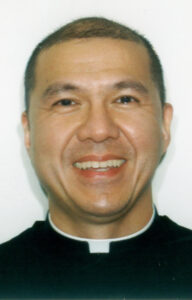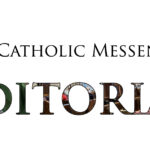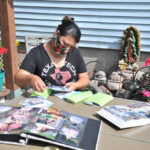By Fr. Joseph Sia
As vocation director I work with all communities in our diocese, but because of my experience and skills I am particularly challenged to explore ways to build a culture of vocations within the Hispanic communities.

Some of the best role models I’ve had for ministry to different cultures are the Jesuit priests whom I grew up with. They were Spanish missionary priests in China in the 1950s who were expelled by the Communists. They came to the Philippines to minister to the Chinese immigrants there. My parents sent me to one of the Jesuit schools in Manila. There I met these Caucasian men who spoke not only Spanish and English but also our native language of Filipino and even Chinese!
I was impressed by their desire to become one of us and to break down barriers that our human limitations could have imposed. In my eyes, those priests were testimonies of Jesus’ offer of salvation for all peoples of the world. That spoke to me so much that I was inspired in my Catholic faith. I really believe they are a crucial factor in why I am still Catholic today!
The example of those missionaries is what moved me to learn Spanish when I was in seminary, and later as a priest to minister to Hispanic Catholics in the different parishes where I have been assigned so far in our diocese. After 11 years of working with the Hispanic communities, I have learned many things which I hope can be useful as I try to promote discernment of the vocation to the priesthood.
One of the most important things I have discovered is a great diversity in that population. Unfortunately, some stereotypes have emerged as regards Hispanic immigrants and, as is the case with stereotypes, they are not all true. For example, not all are from Mexico; among Mexicans, there is a great variety of culture, tradition and religious practices. Another example: some Hispanics in our diocese (especially the younger ones) were born here and are more fluent in English than Spanish, yet most were taught the basic Catholic prayers in Spanish by their parents, so they may not know these prayers in English. These are just a couple of examples of the diversity I’ve seen.
On the other hand, some typical characteristics among Hispanics play a role in spiritual formation and discernment of vocations. The Hispanic culture is more communal and family-oriented; the family unit is seen as extended and not nuclear. More is expected of children as regards their obligations toward their parents (e.g., children are to take care of their aging parents at home and not put them in a nursing home). Especially among more recent immigrants, a desire to establish economic stability creates pressure to get a “good job” — meaning, high-paying employment in a large city or company.
Obviously, in these cases the diocesan priesthood isn’t an appealing vocation because being a priest means being separated from one’s family to serve in multiple parishes which may be far from one’s home or not earning enough to help one’s parents, brothers and sisters. These are just some of the challenges that I’ve encountered in my interactions with my Hispanic parishioners.
My plans to continue promoting vocation discernment in the Hispanic population include:
• Establishing vocations committees in parishes with Hispanic ministry (which began with the Hundredfold Workshop last December).
• Bringing the Totus Tuus summer program to Hispanic parishes and developing relationships with the youths. For example, at St. Mary Parish in Davenport we started a weekly “Futbol” (soccer) club where we invite youths to play soccer in the church field.
• Working with Hispanic Lay Ministry formation through the Multicultural Office.
• Collaborating with the Hispanic charismatic movements in our diocese.
• Presiding at Spanish Masses in different parishes to talk about vocations.
At the end of the day, my hope is in the Lord. When faith formation and vocation discernment are done within the context of a loving relationship with God, then God’s voice will be heard clearly and the response will be unequivocal. Please join me in continuing to pray for vocations to the priesthood in the Diocese of Davenport.
(Fr. Sia is vocations director for the Davenport Diocese. Contact him at (563) 888-4255 or sia@ davenportdiocese.org.)











